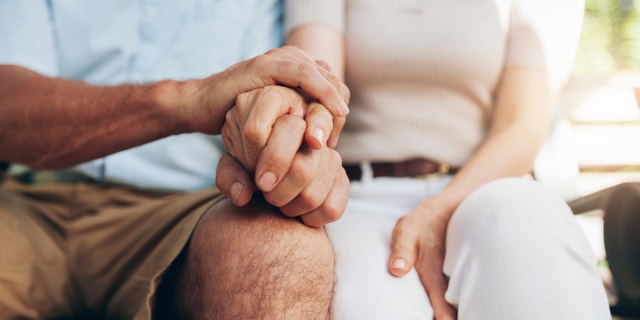
There are the obvious signs of aging — such as wrinkles and gray hair — and then there are the less visible signs, such as a weaker grip.
Beyond creating difficulty in opening jars, turning doorknobs or even shaking someone’s hand, a lack of grip strength could be a warning sign of a shorter life, according to a new study published in the Journal of Cachexia, Sarcopenia and Muscle.
It’s been shown that after age 60, grip strength can decline by up to 25%. Dr. Mark Peterson, an associate professor of physical medicine and rehabilitation at the University of Michigan, was curious about the relationship between grip strength and the aging process.
AGING FASTER IN ADULTHOOD LINKED TO HEALTH CONDITIONS IN ADOLESCENCE
“There have been many studies showing that people with muscle weakness are at a higher risk for diseases and tend to die earlier than stronger people, but until now, there hasn’t been a great explanation for that link — aside from assuming that people who lead healthier lives are known to live longer,” Peterson told Fox News Digital.
“We were interested in exploring a cellular biological link between the measure of strength and the negative consequences that arise during aging.”

For the new study, researchers evaluated 43,000 men and women who were at least 51 years old, with an average age of 70. (iStock)
For the study, researchers evaluated 43,000 men and women who were at least 51 years old, with an average age of 70.
Every other year during an eight-year span, the participants visited a research lab to squeeze a muscle strength testing tool called a dynamometer, which measures grip strength in pounds.
“Weakness is the new smoking.”
The study found that those with weaker grips demonstrated “DNA methylation age acceleration” — which means they showed signs of aging faster than did those with stronger grips.
Peterson said he expected to see this link between weakness and faster aging — but he was a bit surprised by how strong the association was.
“We’ve been using the new tagline, ‘Weakness is the new smoking,’” he said.
LONELINESS AND UNHAPPINESS CAN AGE US FASTER THAN SMOKING
“It sounds like an exaggeration, but it’s really not. There’s enough data to back up that claim.”
Ideally, Dr. Peterson said doctors should do grip testing during routine office visits as a measure of functional strength.
Does a stronger grip help people live longer?
If someone already has a weak grip, working on making those muscles stronger won’t magically add years to their life, Peterson said.
In other words, weak grip strength is an indicator of accelerated aging — but doesn’t cause it.

Grip strength is correlated to overall body strength. So if a person’s grip is strong, there’s a good chance the arms, legs, stomach and other body parts are also strong. (iStock)
As the doctor explained, grip strength is correlated to overall body strength — so if your grip is strong, there’s a good chance your arms, legs, stomach and other body parts are also strong.
Conversely, a person with a weak grip likely has weakness in other areas.
“If somebody has weak grip strength, it should be a red flag that they have a high risk for age-related chronic diseases,” Dr. Peterson said.
“Do all the things in life that are important for improving the overall robustness of the body.”
“I won’t claim that if you improve your grip strength, you’ll also improve your health, because that is definitely not true,” he said. “The solution is not to improve grip strength, but to do all the things in life that are important for improving the overall robustness of the body.”
That means focusing on things such as healthy nutrition and regular physical activity.
FRESH VEGETABLES AND OTHER FRESH FOOD CAN BE YOURS AT HOME WITH PLANNING, PURPOSE
Strength training is particularly important for middle-aged and older adults, as they tend to have less lean muscle mass.
“Overall strength is a very powerful way to ward off functional decline with age, which is highly associated with things like osteoporosis, falls, fractures, dementia, cardiovascular disease and diabetes,” Dr. Peterson added.
“Your biology ages slower with healthy behaviors,” he said.
Get a (stronger) grip
While grip strength exercises might not be a guaranteed health booster, they can make daily life easier and more enjoyable.
If a weak grip is keeping you from doing the activities you need or want to do — whether it’s golfing, carrying a child or shoveling snow — there are things you can do to bolster those muscles.

“Overall strength is a very powerful way to ward off functional decline with age.” (iStock)
Brittany Ferri, Ph.D., an occupational therapist outside Rochester, New York, notes that grip strength is especially important for older people who need to use mobility devices like walkers, wheelchairs or canes.
“Grip strength can mean the difference between propelling a wheelchair on your own and requiring a caregiver to do it for you, which is a huge step between independence or dependence for somebody whose mobility is severely limited,” Ferri told Fox News Digital.
“Grip strength can mean the difference between … independence or dependence.”
To strengthen one’s grip, Ferri recommends squeezing a stress ball throughout the day. She prefers the kind with some sand in them, as they offer a bit of resistance.
Therapy putty is another option.
“It looks pretty similar to play dough, but has a much tougher texture and offers more resistance,” Ferri explained. “You can squeeze it, stretch it out, roll it into a ball, separate it into two pieces — all of that will help with grip strength.”
CLICK HERE TO SIGN UP FOR OUR HEALTH NEWSLETTER
In a pinch, a tight rubber band can also help work the hand muscles.
Place the band around all fingers on both hands and then spread the hands and fingers apart as wide as possible.
CLICK HERE TO GET THE FOX NEWS APP
For most healthy adults, Ferri recommends doing grip-strengthening exercises at least a couple of times per week or as often as once a day.

 Latest Breaking News Online News Portal
Latest Breaking News Online News Portal




